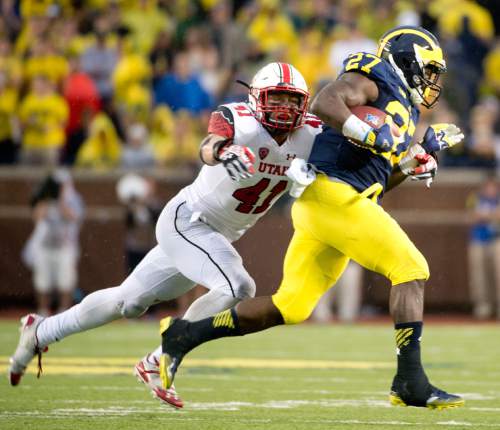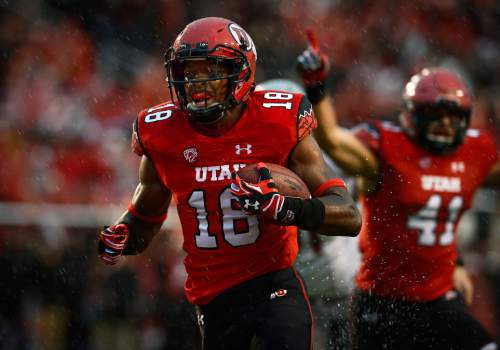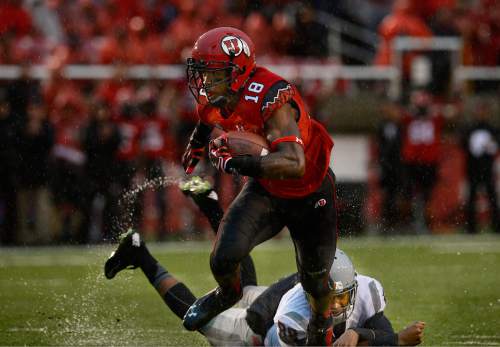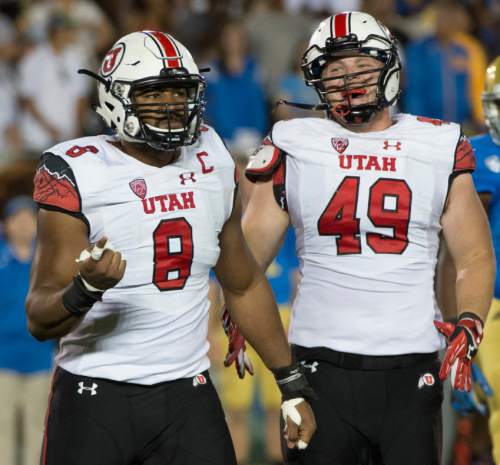This is an archived article that was published on sltrib.com in 2014, and information in the article may be outdated. It is provided only for personal research purposes and may not be reprinted.
When Chris Hill was asked a dozen or so years ago — before the Pac-12 move, before the undefeated seasons — about how he envisioned the future of his program, he had an answer on the tip of his tongue.
Oregon, the Utah athletic director said. I want us to be like Oregon.
Even back then, the Ducks were morphing into a powerhouse: Their record improved every season between 1996 and 2001. Nike had begun pouring money into the athletic programs, and Autzen Stadium was known as one of the loudest, toughest places to play in the West.
In the last decade, though, Oregon has evolved into a true national power, with double-digit wins every year. But so has Utah, to the point where, although the program still would like to match Oregon's success, the Utes aren't using anyone's blueprint but their own.
"Now we have our own identity," Hill said this week. "We've built our program up, and a lot of the things you saw at Oregon at that time, we have that now. Facilities, talent, good coaching. We aspire to be the best Utes we can be."
The past two seasons put Utah's potential in question, but the 2014 campaign has offered up a much more satisfying vision of just how good the Utes can be. Ranked No. 20 this weekend, 6-2 Utah is expected to provide a meaningful challenge to the No. 5-ranked Ducks' crusade toward playing for the national championship. Just last year, it was mostly a speed bump.
How have they done it? On the field, the Utah brand is evident: great defense, dynamic plays on special teams, and mistake-free offense. But clearly in the early days of the Pac-12 era, something was lacking in that formula: The right mix of talent and leadership.
That's been the key this season: At last, Utah has both. And going forward, they're looking for more teams in the same mold of the one they have now.
"We knew there was going to be a transitional period and a process we were going through to get where we needed to be," Utah coach Kyle Whittingham said. "We're still going through that process."
While losing 18 of their first 27 Pac-12 games, the Utes couldn't chase down the fleet-footed backs and wideouts in the conference, and their own offensive players often struggled to stretch the field. They needed big athletes who didn't sacrifice speed.
There was a recruiting jolt that came with joining the Pac-12, and the players who signed out of high school after the Utes joined the conference are now in starring roles: Nate Orchard, Eric Rowe and Jeremiah Poutasi to name a few.
But the coaching staff also knew it had to take a few chances as well: Junior college players such as Tevin Carter, Kaelin Clay and Devontae Booker all had academic struggles, which had steered some schools off their trail. Utah invested in those players, and its own academic support staff, to get things done in the classroom so they could show their talent on the field.
"Ever since I've been here, 20 years, there's always a handful of guys you've got to stick your neck out a little bit and take a risk," Whittingham said. "But the situation is if we get them here, and they get through the eligibility hoops, once they get here, they flourish."
That has certainly been true this year: In one way or another, all of those risks have paid off, from Booker's 990-yard rushing season, to Clay's four touchdown returns, to Carter's limited but impactful snaps that included a pick-six. Other transfers, like Gionni Paul and Jason Fanaika, have been key players as well.
But there isn't much point to adding talent without a strong, stable culture. And Utah gets that from the players who were already here. Whittingham has talked about the leadership that's trickled from Orchard on down. Having players such as Rowe, Brian Blechen and Junior Salt setting the practice expectations has been invaluable.
Any of the newcomers will tell you why it was easy to blend in.
"My teammates, man, my teammates make it easy," Paul said. "I sat out a year, and they were there to lift me up, to lift my spirit up. ... We love our group, we're so close together."
That closeness may help explain the tight wins Utah has pulled out this year. Their talent kept the Utes in games, and single-minded focus gave them the ability to find victory. Only four points, the team is quick to note, separates it from a perfect season.
There's still much on the line, though Utah is now out of the driver's seat for the Pac-12 South title. But the Utes can still spoil Oregon's own playoff dreams, and they can win their way to a better bowl game. They can show the rest of the Pac-12 that their early season success is no fluke: They plan on finishing this thing out.
"The biggest thing for me was going out on a winning season and definitely a bowl game," Blechen said. "I think the way things have happened, we're proud at how we've started the season. But now we've got to finish it, and that starts against Oregon."
Twitter: @kylegoon —
No. 5 Oregon at No. 20 Utah
Kickoff • Saturday, 8 p.m. MT at Rice-Eccles Stadium
TV • ESPN
Radio • ESPN 700 AM
Records • Utah (6-2, 3-2); Oregon (8-1, 5-1)
Series history • Oregon leads, 19-8
Last meeting • Nov. 16, 2013 at Oregon; Oregon 44, Utah 21
About the Utes • Devontae Booker needs only 10 yards to become the 12th 1,000-yard rusher in school history, and he's ranked 11th in the country with 123.8 rushing yards per contest. ... Utah is leading the nation in sacks (39) and Nate Orchard is second nationally in sacks per game (1.5) with the most by any Ute in a season since 1999. ... Utah is ranked second in the Pac-12 in both scoring defense (21.2 ppg) and rushing defense (128.0 ypg).
About the Ducks • Junior quarterback Marcus Mariota is Oregon's career record-holder in a number of offensive categories, including total offense (10,760 yards) and touchdown passes (89). ... Of Oregon's 54 touchdown drives this season, 28 have taken two minutes or less. ... Mark Helfrich's 19 wins in his first 22 games as head coach is the second-best start in Pac-12 history, matching his predecessor Chip Kelly. —
No. 5 Oregon at No. 20 Utah
O Saturday, 8 p.m. MST
TV • ESPN









